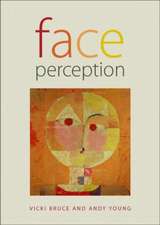The Psychology of Graphic Images: Seeing, Drawing, Communicating
Autor Manfredo Massironi, Translated by N Brunoen Limba Engleză Hardback – aug 2001
Avoiding the kinds of aesthetic rankings of different graphic domains so often made by art historians and critics, Manfredo Massironi considers an extensive and representative sample of graphic applications with an open mind. He finds a deep mutuality between the material components of images and the activation of the perceptual and cognitive processes that create and decipher them.
Massironi first examines the material components themselves: the mark or line, the plane of representation (the angle formed by the actual drawing surface and the depicted objects), and the position of the viewpoint relative to the depicted objects. The roles played by these three components are independent of the content of the drawing; they function in the same way in concrete and abstract representations. He then closely scrutinizes the choices made by the person planning and executing the drawings. Given that any object can be depicted in an infinite number of different ways, the drawer performs continuous work emphasizing and excluding different features. The choices are typically unconscious and guided by his or her communicative goals. A successful graph, be it simple or complex, is always successful precisely because the emphasized features are far fewer in number than the excluded ones. Finally, he analyzes the perceptual and cognitive integrations made by the viewer.
Drawings are not simply tools for communication but important instruments for investigating reality and its structure. Richly illustrated, the book includes a series of graphic exercises that enable readers to get a sense of their own perceptual and cognitive activity when inspecting images. Massironi's pathbreaking taxonomy of graphic productions will illuminate all the processes involved in producing and understanding graphic images for a wide audience, in fields ranging from perceptual and cognitive psychology through human factors and graphic design to architecture and art history.
| Toate formatele și edițiile | Preț | Express |
|---|---|---|
| Paperback (1) | 432.06 lei 6-8 săpt. | |
| Taylor & Francis – aug 2001 | 432.06 lei 6-8 săpt. | |
| Hardback (1) | 1015.92 lei 6-8 săpt. | |
| Taylor & Francis – aug 2001 | 1015.92 lei 6-8 săpt. |
Preț: 1015.92 lei
Preț vechi: 1238.93 lei
-18% Nou
Puncte Express: 1524
Preț estimativ în valută:
194.39€ • 202.96$ • 160.89£
194.39€ • 202.96$ • 160.89£
Carte tipărită la comandă
Livrare economică 05-19 aprilie
Preluare comenzi: 021 569.72.76
Specificații
ISBN-13: 9780805829327
ISBN-10: 0805829326
Pagini: 328
Ilustrații: Illustrations
Dimensiuni: 178 x 254 x 26 mm
Greutate: 0.9 kg
Ediția:1
Editura: Taylor & Francis
Colecția Psychology Press
Locul publicării:Oxford, United Kingdom
ISBN-10: 0805829326
Pagini: 328
Ilustrații: Illustrations
Dimensiuni: 178 x 254 x 26 mm
Greutate: 0.9 kg
Ediția:1
Editura: Taylor & Francis
Colecția Psychology Press
Locul publicării:Oxford, United Kingdom
Public țintă
ProfessionalCuprins
Contents: Introduction. Invariance and Transformation. The Elusive Context. The Quest for Balance. What Makes a Graphic Image Work? Visualizing the Invisible. Seeing and Showing Time. Graphics and Perception. Ambiguity and Information. Toward a Taxonomy of Drawings.
Recenzii
"Widely known and highly respected as a graphic artist and psychological researcher, Massironi is very well qualified to write a book on the psychology of graphic images....including extensive indexes and references, this book is recommended for readers at all levels."
—CHOICE
"Too often psychological discussions of visual images are wooden and the mere application of principles of experimental psychology to visual material. The same cannot be said of Manfredo Massironi's The Psychology of Graphic Images, which marvels at the richness and complexity of graphic signs and the ways they create meaning."
—Leonardo Digital Reviews
"Too often, psychological discussions of visual images are wooden, the mere application of principles of experimental psychology to visual material. The same cannot be said of Manfredo Massironi's The Psychology of Graphic Images, which marvels at the richness and complexity of graphic signs and the ways they create meaning. Massironi writes in the best tradition of the European intellectual....His discussion is both rigorous, often making fundamental contributions to aspects of picture perception, and humane, as he preserves the greatness of what he is examining."
—International Society for the Arts, Sciences, & Technology
"This is a pioneering and thoughtful treatment....It never fails to be insightful and is at times quite brilliant. From the wealth of the illustrations and the rigor of the writing one cannot fail to see that this work was written by a scholar/artist who is equally at home in perception research and artistic creation."
—Michael Kubovy
University of Virginia
—CHOICE
"Too often psychological discussions of visual images are wooden and the mere application of principles of experimental psychology to visual material. The same cannot be said of Manfredo Massironi's The Psychology of Graphic Images, which marvels at the richness and complexity of graphic signs and the ways they create meaning."
—Leonardo Digital Reviews
"Too often, psychological discussions of visual images are wooden, the mere application of principles of experimental psychology to visual material. The same cannot be said of Manfredo Massironi's The Psychology of Graphic Images, which marvels at the richness and complexity of graphic signs and the ways they create meaning. Massironi writes in the best tradition of the European intellectual....His discussion is both rigorous, often making fundamental contributions to aspects of picture perception, and humane, as he preserves the greatness of what he is examining."
—International Society for the Arts, Sciences, & Technology
"This is a pioneering and thoughtful treatment....It never fails to be insightful and is at times quite brilliant. From the wealth of the illustrations and the rigor of the writing one cannot fail to see that this work was written by a scholar/artist who is equally at home in perception research and artistic creation."
—Michael Kubovy
University of Virginia
Notă biografică
Manfredo Massironi, Translated by N Bruno
Descriere
Drawings are not simply tools for communication but important instruments for investigating reality and its structure. This pathbreaking book, richly illustrated, with exercises for readers, illuminates the complex interactions between the material























